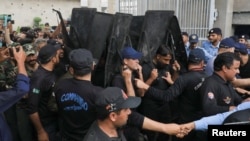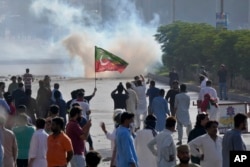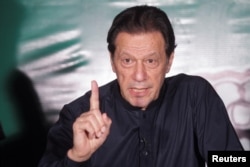Global and local human rights campaigners in Pakistan asked the government Wednesday to transfer political activists who are set to be prosecuted in military courts for arson to the civilian justice system.
Pakistani authorities have handed dozens of former prime minister Imran Khan’s supporters to the army recently for trial in military tribunals. They are accused of attacking public and defense installations during several days of protests sparked by Khan's dramatic, short-lived May 9 arrest on corruption charges.
Human Rights Watch said in a statement that a military trial of civilians would breach Pakistan's obligations under international human rights law.
"Pakistan's military courts, which use secret procedures that deny due process rights, should not be used to prosecute civilians, even for crimes against the military," said Patricia Gossman, the U.S.-based watchdog's associate Asia director.
She questioned the integrity of the military tribunals, noting that their judges are serving officers and are not independent of the government.
Gossman said that while Prime Minister Shehbaz Sharif's administration is responsible for prosecuting those committing violence, it should try civilians only in independent and impartial civilian courts.
The independent Human Rights Commission of Pakistan said Wednesday it strongly opposes the government's decision to try civilians under military law. Hina Jilani, the commission's chief, said that "the arbitrary manner" used to select cases to be tried by military courts denies the suspects' constitutional right to a fair trial.
"There is no due process in military courts. Independence and impartiality of these courts are always questionable and people do not get real justice," Jilani told VOA.
Police have rounded up thousands of members of Khan's opposition Pakistan Tehreek-e-Insaf, or PTI, party in connection with the protests amid allegations of abuses against female detainees in particular. Critics describe the nationwide military-backed crackdown as an attempt to crush the country's largest political force.
On Tuesday, Interior Minister Rana Sanaullah threatened that even Khan could face a military court trial, accusing the 70-year-old opposition leader of being the "architect" of the violence against defense installations.
The former prime minister and his party have condemned the violence, alleging that government intelligence agencies infiltrated saboteurs to justify the ongoing crackdown on the PTI. The army says it has collected "irrefutable evidence" against arsonists.
Sharif has endorsed the military trials under what is known as the Pakistan Army Act and Official Secrets Act. He has pledged to use special anti-terrorism courts to try those responsible for vandalizing public property.
Speaking in parliament last week, Sharif denounced attacks on military installations as an “outright enmity” against the country. "Therefore, all these cases will be tried under the Army Act," he said, referring to the platform exclusively used to prosecute military personnel and enemies of the state.
"For the Pakistani government to threaten to prosecute Imran Khan in compromised military courts is a virtual admission that the "case" against him is weak. If he really did something wrong, why not prosecute him in independent civilian courts?" tweeted Kenneth Roth, a former executive director of Human Rights Watch.
A parliamentary vote of no-confidence removed Khan from power in April 2022, nearly four years into his coalition government. He accused the military of plotting the vote in collusion with Sharif and the United States.
Washington and Sharif reject the allegations. The government has also maintained elections would be held later this year when parliament completes its mandated five-year term.
According to opinion surveys, Khan is still the most popular politician in Pakistan, but he remains embroiled in more than 100 legal cases instituted against him since his ouster.
The allegations range from corruption and terrorism to sedition and blasphemy. The deposed prime minister rejects all the charges as politically motivated and an attempt by the military to disqualify him from the national electoral process.
Military's role
The ongoing crackdown on Khan's party has forced dozens of PTI leaders, including former lawmakers and ministers, to either quit the party or take a break from politics, paving the way for their release from police custody.
Almost all of the defectors in televised news conferences made identical statements. They condemned the attacks on military installations, pledging their loyalty to the powerful security institution and saying they were not abandoning Khan under duress.
Critics continue to point figures at the military, saying the institution was behind Khan's rise to power and is now trying to keep him from staging a comeback.
"I think the aim of this political engineering at this time is to clean up the mess that the military had created in 2018. The military has no business to engineer politically or re-engineer," Jilani said.
In a recent editorial, the prestigious English-language daily newspaper Dawn raised questions about the motives behind the desertions.
"One wonders what kind of duress they were under: was it simply the terrible conditions of the prison, or blackmail, threats against family, or something worse? It is difficult to say," the paper wrote.
"What isn't as difficult to surmise is who is behind the campaign to break apart yet another political movement that has grown too big for the state's liking. Their playbook hasn't changed," said the editorial, indirectly referencing the Pakistani military's long-standing intervention into national politics.
Khan has also contacted British and U.S. lawmakers to draw their attention to alleged human rights violations against his supporters.
Republican Sheila Jackson Lee, the chairwoman of the U.S. House's Congressional Pakistan Caucus, wrote on Twitter last Friday she would be writing to President Joe Biden and Secretary of State Antony Blinken to ask them to help bring an end to "human rights violations" against the opposition.
"I am extremely concerned about the reports that are coming out of Pakistan of human rights abuses and the lack of protection for those who express peaceful opposition to the government," Jackson Lee said.
The military has staged three coups and ruled Pakistan for more than three decades. Former army chief General Qamar Javed Bajwa acknowledged in a televised speech just days before his retirement last November that the military had been interfering in politics for the last seven decades.








